De Belgische dichter en schrijver Leonard Nolens werd geboren in Bree op 11 april 1947. Zie ook alle tags voor Leonard Nolens op dit blog.
Liefde didactisch
Zij spannen traag hun winterkleren voor de ramen
En sluiten elkaar en het straatlawaai in hun armen.
Zij gaan vanmiddag bloot een groot horloge binnen.
De wijzers zijn zijzelf. Zij maken plaats en tijd.
Een simpele duim op haar tepel verandert de wereld
Van deze volksbuurt in een kamer zonder pijn,
Een bed waaronder twee paar tranen samen slapen
Met afgelopen schoenen. Geluk heeft geen contour.
Langzaam vrijen is ook dat ronde kruispunt beneden.
Daar lopen mensen zoals wij van hen te dromen.
Zonder mij
Wat kan ik voor je doen, ik heb alleen maar woorden.
Met die muziek heb ik ons huis gebouwd, mijn leven
Vernield om toe te zien of dood de moeite waard is,
Of ik daar weg mee kan zonder te moeten sterven.
Wat kan ik voor je doen, ik moet toch van je blijven.
Ik heb je toch op mij genomen zonder je te nemen,
Zonder me te geven want ik ben alleen maar jij.
Ik ben alleen maar jij geweest om niet te moeten zijn.
Ik ben alleen maar jij geworden om niet ik te zijn.
Dat is een laffe liefde, Zoet, vergeef het mij.
Wat kan ik voor je doen, ik ben alleen maar woorden,
Wou je worden, wou ons worden zonder mij.
Laat
Vertraag.
Vertraag.
Vertraag je stap.
Stap trager dan je hartslag vraagt.
Verlangzaam.
Verlangzaam.
Verlangzaam je verlangen
En verdwijn met mate.
Neem niet je tijd
En laat de tijd je nemen –
Laat.
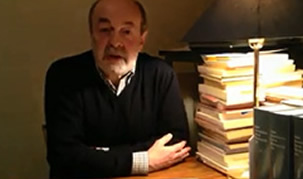
Leonard Nolens (Bree, 11 april 1947)
De Amerikaanse dichter en schrijver Mark Strand werd geboren op 11 april 1934 in Summerside, Prince Edward Island, Canada. Zie ook alle tags voor Mark Strand op dit blog.
Breath
When you see them
tell them I am still here,
that I stand on one leg while the other one dreams,
that this is the only way,
that the lies I tell them are different
from the lies I tell myself,
that by being both here and beyond
I am becoming a horizon,
that as the sun rises and sets I know my place,
that breath is what saves me,
that even the forced syllables of decline are breath,
that if the body is a coffin it is also a closet of breath,
that breath is a mirror clouded by words,
that breath is all that survives the cry for help
as it enters the stranger’s ear
and stays long after the world is gone,
that breath is the beginning again, that from it
all resistance falls away, as meaning falls
away from life, or darkness fall from light,
that breath is what I give them when I send my love
A Piece Of The Storm
For Sharon Horvath
From the shadow of domes in the city of domes,
A snowflake, a blizzard of one, weightless, entered your room
And made its way to the arm of the chair where you, looking up
From your book, saw it the moment it landed.
That’s all There was to it. No more than a solemn waking
To brevity, to the lifting and falling away of attention, swiftly,
A time between times, a flowerless funeral. No more than that
Except for the feeling that this piece of the storm,
Which turned into nothing before your eyes, would come back,
That someone years hence, sitting as you are now, might say:
“It’s time. The air is ready. The sky has an opening.”
The End
Not every man knows what he shall sing at the end,
Watching the pier as the ship sails away, or what it will seem like
When he’s held by the sea’s roar, motionless, there at the end,
Or what he shall hope for once it is clear that he’ll never go back.
When the time has passed to prune the rose or caress the cat,
When the sunset torching the lawn and the full moon icing it down
No longer appear, not every man knows what he’ll discover instead.
When the weight of the past leans against nothing, and the sky
Is no more than remembered light, and the stories of cirrus
And cumulus come to a close, and all the birds are suspended in flight,
Not every man knows what is waiting for him, or what he shall sing
When the ship he is on slips into darkness, there at the end.
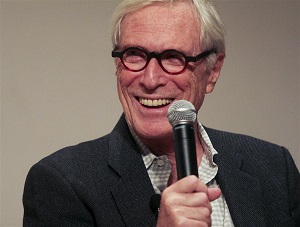
Mark Strand (Summerside, 11 april 1934)
De Tunesische dichter, schrijver, essayist en vertaler Walid Soliman werd geboren op 11 april 1975 in Tunis. Zie ook alle tags voor Walid Soliman op dit blog.
Uit: Three hours in Fiumicino (Vertaald door Jason Casper)
“When the stewardess finally escaped, the Belgian lady said to me, “Her situation has gotten a lot worse, and they are in contact with Fiumicino Airport, since it is the nearest one.”
It was clear the fat lady was interested, for she had found in the saga of the sick passenger something even to distract her from eating.
Suddenly I heard the voice of the stewardess over the loudspeaker announcing we were forced to land at Fiumicino Airport, for the woman’s situation had become critical.
It was a sunny spring day, with a beautiful view of the Mediterranean from the airplane window. It was enough to make a man feel at rest. But then I turned again to pay attention to the fat lady, when she asked, “Do you think she’ll make it?”
She said these words as if she was talking to herself, for it seemed she was getting quite excited. She kept fidgeting in her seat trying to look back to see what was happening, and if not for the belt that tied her there, she would have left her seat altogether to get closer to what was happening.
I felt the plane begin to veer a bit from its route, and when I looked out the window it became clear it had completely changed direction. The murmuring of the passengers increased, and a sense of unsettledness filled the air. No longer was only the ocean visible, but fields and highways as well, and I realized we were now flying over the skies of Rome.”
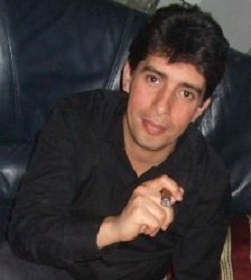
Walid Soliman (Tunis, 11 april 1975)
De Hongaarse dichter Attila József werd geboren op 11 april 1905 in Boedapest. Zie ook alle tags voor Attila József op dit blog.
Ode
I am sitting
here on a glittering wall of rocks.
The mellow wind of the young summer
like the warmth of a good supper
flies around.
I let my heart grow fond of silence.
It is not so difficult,
– the past swarms around –
the head bends down
and down hangs the hand.
I gaze at the mountains’ mane
every leaf reflects the glow
of your brow.
The road is empty, empty,
yet I can see
how the wind makes your skirt flutter
under the fragile branches of the tree.
I see a lock of your hair tip foreward
your soft breasts quiver
– as the stream down below is running away
behold, I see again,
how the ripples on round white pebbles
the fairy laughter spouts out on your teeth.
Vertaald door Thomas Kabdebo
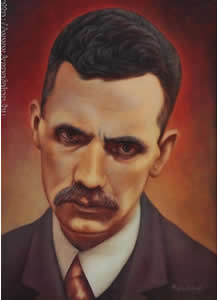
Attila József (11 april 1905 – 3 december 1937)
Portret door Hajós-Balogh János
De Duitse dichter Rolf Schilling werd geboren in Nordhausen in de Harz op 11 april 1950. Zie ook alle tags voor Rolf Schilling op dit blog.
Königskerzen
Wo sich Äste schwärzen
Vor gestürztem Stamm,
Sieh der Königskerzen
Goldenes Geflamm.
Ihre Zeit zu messen,
Bist du nicht bestellt,
Herbst hat sie vergessen,
Schlank im Sonnenzelt
Stehn sie, leise zitternd,
Wenn der Wind sie streift,
Ihren Heimgang witternd,
Doch kein Schatten greift
Heut nach ihren Kronen,
Die so sicher stehn,
Daß die Schnitter schonen,
Was sie längst erspähn.
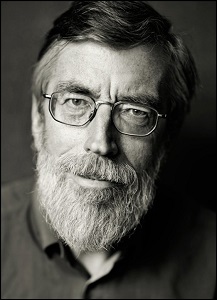
Rolf Schilling (Nordhausen, 11 april 1950)
De Hongaarse schrijver Sándor Márai werd geboren op 11 april 1900 in Kassa (nu Košice, Slowakije). Zie ook alle tags voor Sándor Márai op dit blog.
Uit: Gloed (Vertaald door Mari Alföldy)
“Ze was als een wild dier; de degelijke opvoeding, het nonnenklooster, de eruditie en de tederheid van haar vader, dat alles heeft slechts haar manieren verzacht. Vanbinnen was Krisztina wild en ontembaar (…) Ook haar trots was anders dan die van mensen die trots zijn op hun rang, afkomst, bezit, maatschappelijke positie of een bepaald persoonlijk talent. Krisztina was trots op die edele wildheid, die in haar hart en haar zenuwen leefde als een of ander gif, als een erfenis. Die vrouw was vanbinnen soeverein. Kennelijk is dat geen kwestie van afkomst en positie. Ze kon niet gekrenkt worden, ze kon niet voor een situatie gesteld worden waarvoor ze terugdeinsde, ze kon geen beperking verdragen, in geen enkele betekenis van het woord. (…)
Je herinnert je misschien de eerste keer dat we elkaar ontmoetten: Krisztina kwam binnen en het donkere kamertje werd plotseling gevuld met licht. Ze bracht niet alleen de jeugd, nee, ze bracht hartstocht en trots, het soevereine bewustzijn van onvoorwaardelijke gevoelens. Ik heb sindsdien ook geen mens gezien die zo totaal reageerde op datgene wat de wereld en het leven geven: op muziek, een boswandeling in de vroege ochtend, de kleur en de geur van een bloem, op een zinnig en juist woord van een mens. Niemand kon een edel weefsel of een dier zo totaal aanraken als Krisztina. Ik heb niemand gekend die zo blij kon zijn met gewone geschenken van het leven als die vrouw, alsof ze een persoonlijke betrokkenheid had bij alle verschijnselen van de wereld, begrijp je?”
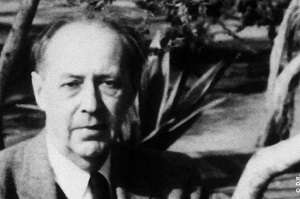
Sándor Márai (11 april 1900 – 22 februari 1989)
Zie voor nog meer schrijvers van de 11e april ook mijn blog van 11 april 2012 deel 2 en ook mijn blog van 11 april 2011 deel 3 en eveneens deel 4.
